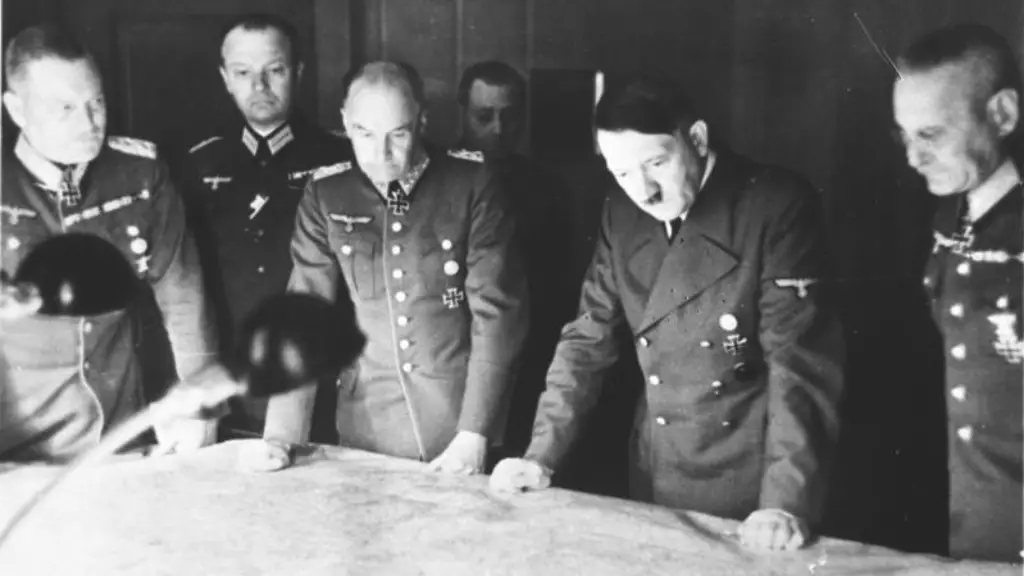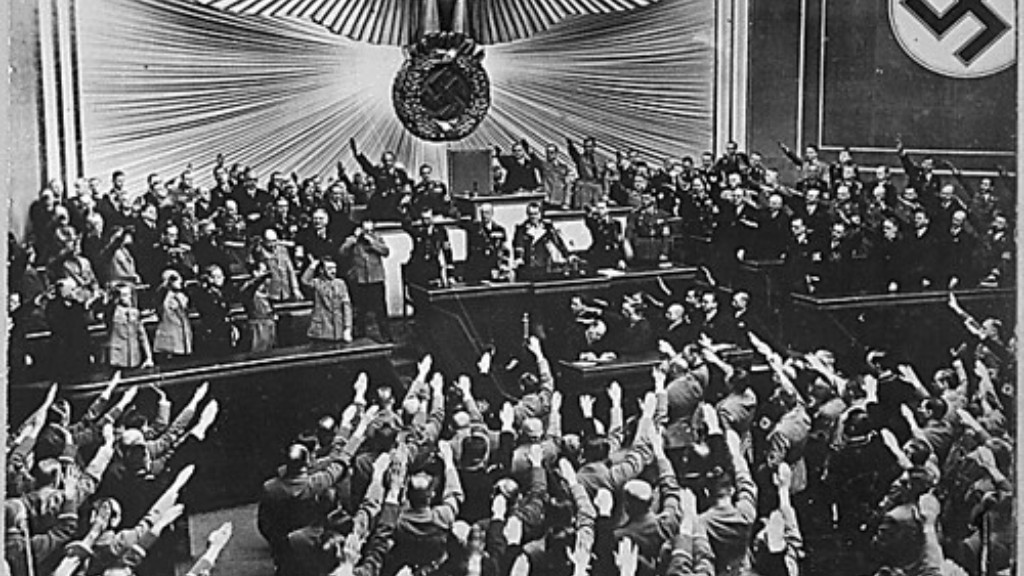Adolf Hitler and his Nazi party are responsible for the one of the most horrific acts in history: the Holocaust, or the intentional and systematic extermination of over six million Jewish people during World War II. The reason why this happened has been explored thoroughly by historians, psychologists, and other experts and a consensus has been reached as to why Hitler was so intent on mass extermination.
Many believe that Hitler’s anti-Semitism was the driving force behind the killings. His belief that Jews were inferior to others and his contention that ‘The Jewish question’ had to be solved, are well-documented in his writings and speeches. This anti-Semitism had existed in Europe, especially among the German people, long before Hitler came to power, and was an important factor in his rise to power. This atmosphere of bigotry and hatred gave Hitler a receptive audience and the power to execute his plans.
Others believe that the decision to exterminate Jews was motivated by the Nazi party’s desire for racial purity. For Nazis, Jews were seen as, “an unnatural and inexorable force” that threatened the ‘Aryan’ German race. Extermination was seen as a way to protect Germany from perceived ‘dangers’ posed by the Jews. This is supported by the fact that Jews were the first group targeted for extermination and the Nazis went to great lengths to ensure their elimination. In addition, the Nazi’s ‘Final Solution’ was a plan for the complete extermination of all Jews in Nazi-controlled territories.
Yet other experts point out that the Holocaust was the end product of years of Nazi propaganda and ideological indoctrination. Nazi propaganda was used to shape public opinion and transform Jews into scapegoats. This was done through relentless, vilifying portrayals of Jews in media, speeches and party rhetoric. This stirred up resentment towards Jews and created a climate of fear and hatred towards them among Germans. The ideology of the Nazi party and its hatred of Jews was absorbed by the public and shaped their views of the ‘Jewish question’. This provided the Nazis with the support they needed to carry out the extermination successfully.
It is clear that a combination of factors led to the Holocaust. All contribute to the bigger picture of why Hitler and the Nazi party felt it necessary to exterminate Jews. It is also important to recognize that anti-Semitism had existed for centuries in Europe, and was used to justify and give power to Hitler’s racism. The Nazi’s use of propaganda and indoctrination also played a major role in creating the atmosphere of fear and paranoia necessary for genocide to occur. Last but not least, the desire for racial purity and a final solution to the Jewish question were key elements which led to the destruction of millions of lives.
Anti-Semitic Roots of The Holocaust:
Anti-Semitism is a centuries-old prejudice towards Jewish people and this ultimately formed the foundation of the Holocaust. During the 1930s and 1940s, Nazi Germany was a hotbed of anti-Semitic sentiment. This was fuelled by widespread propaganda, which presented Jews as foreign, untrustworthy and dangerous outsiders. This propaganda was so effective that Hitler was able to secure the majority of voter mandates and garner the support needed to enact his devastating plan.
Hitler and the Nazi party saw Jews as a racial and political threat to their ‘Aryan’ ideals. As such, Jewish people were systematically discriminated against and excluded from society. This culminated in the Nuremberg laws of 1935, which stripped Jews of their rights and citizenship. When World War II broke out, the Nazis began to tear down the ghetto walls and move Jews into concentration camps. This was the first step towards their extermination.
The Holocaust was the product of decades of anti-Semitism and hatred of Jews. This hatred of the ‘outsider’ had been a part of German culture for generations and was a driving force behind the Nazi party’s rise to power. The Nazi’s uncompromising policies and practices towards Jews was the final nail in the coffin and embodied their fanatical vision of a ‘pure’ German race.
Nazi Propaganda Machine
Nazi propaganda was an important element in convincing the German people that Jews were a threat and needed to be eliminated. Nazi propaganda machine was so efficient it was able to persuade people of the need for the persecution and extermination of the Jews.
Nazi propaganda spread lies, fears and hatred with the intention of eliminating all space for doubt in the minds of its subjects. It vilified Jews as a menace to the ‘Aryan’ race, a source of disease and a threat to the German way of life. Jews were portrayed as simultaneously dangerous yet powerless – a scapegoat to blame for all of Germany’s ills. This was done through speeches, books, pamphlets, films, radio, newspapers and even children’s comics.
The most effective propaganda for the Nazis was the idea that Jews had to be completely exterminated. This was a theme repeated over and over, creating a climate of fear and paranoia necessary for genocide to occur. The Nazis also sought to control the narrative by censoring news, books and magazines and silencing any voices of dissent. This allowed them to create a unified, nationalistic vision and cohesively move forward with the ‘Final Solution’.
Nazi propaganda was a powerful and influential tool. Its power was felt throughout Europe and had devastating and far-reaching consequences. It was a major contributing factor to the hate and fear towards Jews in Germany and Europe, which ultimately led to the Holocaust.
Systematic Terror
The Holocaust was a well-coordinated campaign of terror and extermination. It began with the passage of the Nuremberg Laws in 1935, which stripped Jews of their rights and citizenship in Germany. This was followed by the relocation of Jews into concentration camps, or ghettos, where they were separated from the rest of society.
Once in the camps, Jews were subjected to terrible conditions – they were starved, tortured, and subjected to hard labor. The Nazis also experimented on prisoners, with devastating results. This was all in an effort to dehumanize and weaken the Jews, making them more vulnerable and more likely to succumb to the prevailing forces of hate.
By the end of WWII, over six million Jews had died in concentration camps alone. Many more were killed in mass shootings, death marches, and other atrocities. This systematic terror was the direct result of Hitler’s and the Nazi’s vision for a ‘pure’ German race, free of ‘undesirables’.
Responsibility and Accountability
In the years following World War II, a series of trials were held in Germany to prosecute those responsible for the atrocities of the Holocaust. This process, known as the Nuremberg Trials, was the first in history to hold individuals accountable for crimes against humanity. During the trials, those responsible for the killings were found guilty and sentenced accordingly.
The aim of the trials was to punish the guilty and to bring some form of justice to the victims and survivors of the Holocaust. In addition, the trials served as a warning to future generations and as a reminder of the grave consequences of unchecked hatred.
The Nuremberg Trials highlighted the need for accountability in times of mass atrocity. The trials were a major step forward in the development of international law, setting a precedent for future generations. In the years since, the international community has sought to hold leaders accountable for their actions and ensure that events such as the Holocaust are never repeated.
Legacy of the Holocaust
The Holocaust remains one of the darkest chapters in world history. The memory of the millions of lives lost in this tragedy will never be forgotten. The Holocaust serves as a reminder of the power of hatred and racism, and of the dreadful consequences of unchecked power and fanaticism.
In the aftermath of the Holocaust, the international community has sought to reject discrimination and create a more tolerant and inclusive society. Memorials, museums and education are just some of the ways in which the legacy of the Holocaust is kept alive in the modern era.
Though it happened over seven decades ago, the Holocaust has cast a long and dark shadow on our past, and its legacy is still very much felt today. We must all strive to learn from this terrible tragedy and ensure that it never happens again.




